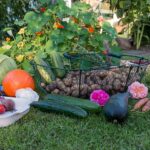What are Perennial Vegetables?
Have you ever walked through the forest and admired all the plants that return year after year? The forest seems to be on autopilot. Ever wonder why your garden can’t do the same thing?
It can! Imagine growing vegetables that require little effort and produce year round. Perennial species (crops, forages and trees) are those able to re-grow and continue to produce
grains, seeds, fruits, and vegetables for multiple years.
They do this without needing to be replanted from seed.
Why Plant perennial vegetables?
Most common food crops today are annuals or biennials. With these, you only get a good crop in the first year. Lettuce, for example, will run to seed within weeks or months even if you only harvest a few leaves at a time. Annual crops require the time intensive act of planting seeds each year and caring for delicate spouts as they go through their growth cycle. They also don’t have enough time to develop a substantial root system, then they die it starts all over again. In addition the soil usually needs to be turned/tilled for the next round of seedlings. Frankly…….this sucks.
On the other hand:
- Perennial vegetables don’t have to be replanted each season.
- Perennial vegetables usually withstand harsh climates and weather better than annuals.
- Perennial vegetables tend to be higher in nutrition than most vegetables.
- Perennial Vegetable are usually more pest and disease resistant.
- Perennial vegetables build strong and extensive root systems that not only prevent soil erosion, but build a strong drought resistant plant.
- Perennial vegetables often offer more than a single product for the table. Ex. sweet potato provides us with delicious starchy roots, but also offers a nutritious green vegetable. Moringa offers both edible leaves and pods. As you can see, perennial vegetables require less work and offer more benefit. This is especially true in warmer climates.
How Long Can Perennial Crops Continue to Produce
Short-lived perennials can live from three to five years before needing to be replaced. Whereas long-lived perennials can live five to twenty years, and sometimes a lot longer. Asparagus can live twenty or more years. Our moringa has been alive and producing for 8 years now. We have Katuk plants that lived for 7 years. Today, both plants continue to abundantly produce nutritious greens. These are just a few examples. Remember…..the goal should be to minimize input and maximize output.
Is there a list or resource to find good perennial species for my area?
I’m building a Survival Plant Database on this site and categorizing Perennial Vegetables, Medicinal Plants and Utility Plants.
This book changed my whole perspective on gardening and food security. It includes many species for both temperate and tropical climates.
Perennial Vegetables By Eric Toensmeier
Grow For The Climate You’re In
This site focuses on perennial vegetables that thrive in hot and moist (tropical) climates, however many of the plants that we grow can also be grown in temperate climates. There are also many annual species that can thrive in temperate climates that are perennial when planted in tropical climates. If you’re concerned about what to grow, you can consider the hardiness zone you live in as an indicator of the best suited perennial plants. For those in the USA, the USDA has an incredible map here: USDA Plant Hardiness Zone Map.
From Katuk and Moringa, to Malabar Spinach, Potatoes and Yuca, there are many plants will produce life-sustaining nutrition for your family year round. Perennial gardening will reduce your work input and maximize your vegetable output.
Below are a few of the PERENNIAL vegetables my family grows.
https://www.youtube.com/watch?v=ZeYF5rtA1NE
I planted an entire line of Katuk on both sides. It’s been alive for over 8 years. Every single leaf is edible and it’s managed without pesticides and very little water.
Red Malabar Spinach growing in our garden. The berries a great natural food coloring.
Pigeon Peas – These bushes/trees produce peas for for 4-5 years. So tasty!
This is the Yuca (Cassava) that we grow.
Stay tuned and we’ll feature all the perennial vegetables and useful plants we’ve been successful with in the Survival Plant Database.





GIPHY App Key not set. Please check settings